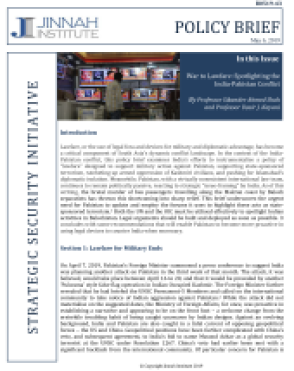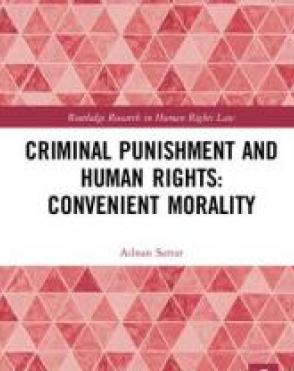Publications
- Law, State and Inequality in Pakistan: Explaining the Rise of the Judiciary
Through a detailed historical and empirical account of post-independence years, this book offers a new assessment of the role of the judiciary in Pakistani politics. Instead of seeing the judiciary as helpless or struggling against an authoritarian state, it argues that the judiciary has been a crucial link in the creation of state and political inequality in Pakistan. This rubs against the central role given to the judiciary in developing countries to fix the ‘corrupt politicians and stubborn bureaucracies’ in the World Bank’s ‘Good Governance’ paradigm and rule of law initiatives. It also challenges the contemporary legal and judicial discourse that extols the virtues of Public Interest Litigation. While the book’s core analysis is a critique of the contemporary liberal legal project, it also adds to the critical tradition of social theory by linking political economy to a social theory of law. The theoretical aspect of the study is applicable to any developing society whose judiciary is going through foreign-sponsored ‘rule of law’ judicial reforms.
Law, State and Inequality in Pakistan: Explaining the Rise of the Judiciary - "War to Lawfare: Spotlighting the India-Pakistan Conflict" - A Policy Brief by Prof. Sikandar Ahmed Shah and Prof. Uzair Kayani
Lawfare, or the use of legal fora and devices for military and diplomatic advantage, has become a critical component of South Asia’s dynamic conflict landscape. In the context of the India-Pakistan conflict, this policy brief examines India’s efforts to instrumentalise a policy of “lawfare” designed to support military action against Pakistan, supporting state-sponsored terrorism, ratcheting up armed oppression of Kashmiri civilians, and pushing for Islamabad’s diplomatic isolation. Meanwhile, Pakistan, with a virtually nonexistent international law team, continues to remain politically passive, reacting to strategic “issue-framing” by India. As of this writing, the brutal murder of bus passengers travelling along the Makran coast by Baloch separatists has thrown this shortcoming into sharp relief. This brief underscores the urgent need for Pakistan to update and employ the forums it uses to highlight these acts as state-sponsored terrorism.1 Both the UN and the OIC must be utilised effectively to spotlight Indian activities in Balochistan. Legal arguments should be built and deployed as soon as possible. It concludes with some recommendations that will enable Pakistan to become more proactive in using legal devices to counter India when necessary.
"War to Lawfare: Spotlighting the India-Pakistan Conflict" - A Policy Brief by Prof. Sikandar Ahmed Shah and Prof. Uzair Kayani - The Constitution of Pakistan: A contextual Analysis
This volume provides a contextual account of Pakistan's constitutional laws and history. It aims to describe the formal structure of government in reference to origins that are traced to the administrative centralisation and legal innovations of colonial rule. It also situates the tide of Muslim nationalism that gave rise to the nation of Pakistan within a terrain of nascent constitutionalism and its associated promises of representation. The post-colonial history of the Pakistani state is charted by reference to succeeding constitutions and the distribution of powers between the major branches of government that they augured. Where conventional histories often suggest that constitutionalism in Pakistan is to be solely understood by reference to a cycle of abidance and rupture, and in the oscillation between military and civilian rule, this volume also accounts for the many points of continuity between regime types. The contours of a broader constitutionalism come to light in the ways in which state power is wielded at different periods and in the range of contests - economic, political and cultural - through which some of this power is sought to be dispersed. Chapters on Rights, Federalism and Islam detail the contextual features of some of these contests and the normative, legal parameters through which they are provisionally settled.
The Constitution of Pakistan: A contextual Analysis - Criminal Punishment and Human Rights: Convenient Morality
This book examines the relationship between international human rights discourse and the justifi cations for criminal punishment. Using interdisciplinary discourse analysis, it exposes certain paradoxes that underpin the ‘International Bill of Human Rights’, academic commentaries on human rights law, and the global human rights monitoring regime in relation to the aims of punishment in domestic penal systems. It argues that human rights discourse, owing to its theoretical kinship with Kantian philosophy, embodies a paradoxical commitment to human dignity on the one hand, and retributive punishment on the other. Further, it sustains the split between criminal justice and social justice, which results in a sociologically ill-informed understanding of punishment. Human rights discourse plays a paradoxical role vis-à-vis the punitive power of the state as it seeks to counter criminalisation in some areas and backs the introduction of new criminal offences – and longer prison sentences – in others. The underlying priorities, it is argued, have been shaped by a number of historical circumstances. Drawing on archival material, the study demonstrates that the international penal discourse produced during the late nineteenth and early twentieth century laid greater emphasis on offender rehabilitation and was more attentive to the social context of crime than is the case with the modern human rights discourse.
Criminal Punishment and Human Rights: Convenient Morality







